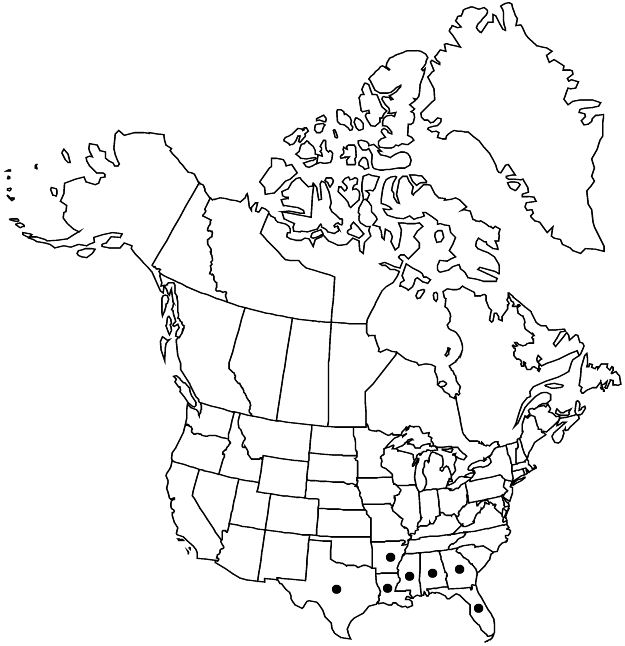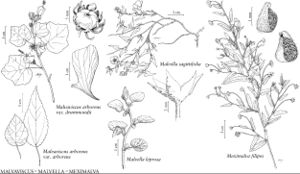Difference between revisions of "Malvaviscus arboreus var. drummondii"
Ann. Missouri Bot. Gard. 29: 215. 1942.
FNA>Volume Importer |
FNA>Volume Importer |
||
| Line 12: | Line 12: | ||
|label=Selected by author to be illustrated | |label=Selected by author to be illustrated | ||
}} | }} | ||
| − | |basionyms={{Treatment/ID/ | + | |basionyms={{Treatment/ID/Basionym |
|name=Malvaviscus drummondii | |name=Malvaviscus drummondii | ||
|authority=Torrey & A. Gray | |authority=Torrey & A. Gray | ||
| + | |publication_title=Fl. N. Amer. | ||
| + | |publication_place=1: 230. 1838 | ||
}} | }} | ||
|synonyms={{Treatment/ID/Synonym | |synonyms={{Treatment/ID/Synonym | ||
| Line 34: | Line 36: | ||
|elevation=0–200 m | |elevation=0–200 m | ||
|distribution=Ala.;Ark.;Fla.;Ga.;La.;Miss.;Tex.;Mexico (Coahuila;Tamaulipas). | |distribution=Ala.;Ark.;Fla.;Ga.;La.;Miss.;Tex.;Mexico (Coahuila;Tamaulipas). | ||
| − | |discussion=<p>It is questionable whether <i></i>var.<i> drummondii</i> is native to states east of Texas. The remarkably uniform populations that grow in central Texas suggest that the variety is native there. The taxon apparently was, early on, taken into cultivation in coastal southeastern United States, where it has escaped and persisted. Variety drummondii is also grown in California, North Carolina, and South Carolina but has not naturalized.</p> | + | |discussion=<p>It is questionable whether <i></i></i>var.<i><i> drummondii</i> is native to states east of Texas. The remarkably uniform populations that grow in central Texas suggest that the variety is native there. The taxon apparently was, early on, taken into cultivation in coastal southeastern United States, where it has escaped and persisted. Variety drummondii is also grown in California, North Carolina, and South Carolina but has not naturalized.</p> |
|tables= | |tables= | ||
|references= | |references= | ||
| Line 58: | Line 60: | ||
|publication year=1942 | |publication year=1942 | ||
|special status=Selected by author to be illustrated | |special status=Selected by author to be illustrated | ||
| − | |source xml=https://jpend@bitbucket.org/aafc-mbb/fna-data-curation.git/src/ | + | |source xml=https://jpend@bitbucket.org/aafc-mbb/fna-data-curation.git/src/f6b125a955440c0872999024f038d74684f65921/coarse_grained_fna_xml/V6/V6_544.xml |
|subfamily=Malvaceae subfam. Malvoideae | |subfamily=Malvaceae subfam. Malvoideae | ||
|genus=Malvaviscus | |genus=Malvaviscus | ||
Revision as of 21:16, 24 September 2019
Plants clone-forming, 0.5–1.5(–3) m, softly hairy. Stems glabrous proximally, densely and minutely tomentose distally. Leaf blades deeply 3-lobed, broadly ovate, 4–9 × 4–12 cm, at least as long as wide, base usually strongly cordate, margins crenate-dentate, apex obtuse (acute). Petals 1.5–3.5 cm. 2n = 28.
Phenology: Flowering summer–fall.
Habitat: Limestone slopes and ledges, wooded arroyos, along streams in shaded areas
Elevation: 0–200 m
Distribution

Ala., Ark., Fla., Ga., La., Miss., Tex., Mexico (Coahuila, Tamaulipas).
Discussion
It is questionable whether var. drummondii is native to states east of Texas. The remarkably uniform populations that grow in central Texas suggest that the variety is native there. The taxon apparently was, early on, taken into cultivation in coastal southeastern United States, where it has escaped and persisted. Variety drummondii is also grown in California, North Carolina, and South Carolina but has not naturalized.
Selected References
None.
